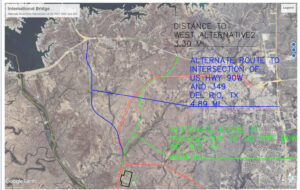By Karen Gleason
The 830 Times
City administrators are urging the city council to abandon the city’s outdated siren alarm system for newer, more reliable and less expensive technology, but some council members say they’d like to keep the sirens working until more residents sign up for emergency notifications.
Del Rio City Council members discussed the siren notification system and staff-recommended replacements during their May 9 meeting.
City Manager John Sheedy, once the city’s foremost advocate for the siren notification system, spoke to the council about the history of the city’s sirens, most of them installed at Sheedy’s insistence and direction following a devastating flood of the San Felipe Creek in August 1998.
Sheedy said by the time he retired from the city in 2013, staff “had already been struggling greatly to maintain the equipment, but all but maybe three sirens were working.”
“When I returned to the city almost seven years later, the majority of the sirens were either down completely or were not functioning properly. In 2019, I started getting quotes and had prepared a presentation for council. I’d offered the previous city manager three times to present to council, but the timing was never right, and then COVID hit and everything was delayed, so of course now I’m back in this position, and it’s time that we address these sirens,” Sheedy told the council.
He asked City Emergency Management Coordinator Joey De Luna to speak to the council about the sirens and other, more modern, methods for notifying residents about emergencies.
“As the city manager just mentioned, we have 17 total sirens, 16 that are out on poles right now. Out of those 16, there are 15 that are working. One of them was struck by lightning, so everything was burned out on that siren. Out of those 15, currently we have four that are working properly, and we have one that works inconsistently, meaning that if we send the signal out to the siren, it stays on, so we have to send multiple signals for it to shut off. The relay that’s in that control board is bad, and we haven’t been able to get anyone to fix that,” De Luna said.
He said the city has struggled to find vendors to work on the sirens and reviewed the pros and cons of using sirens for mass emergency notifications.
De Luna said the city is currently using the Regroup mass notification system to warn residents of threats, sharing the cost of the system with the county.
Councilwoman Alexandra Falcon Calderon asked how many accounts are active to receive the notifications in the city and county.
De Luna said there are currently 2,000 phone numbers signed up for the Regroup notifications.
Mayor Al Arreola asked if visitors in the area when an emergency strikes would be notified, and De Luna said the city is waiting on paperwork from the Integrated Public Awareness Warning System (IPAWS) that will allow the city to access that system.
Once the city can access IPAWS, alerts can be sent out and will be received by any phone in the area, much like an Amber Alert, even if the user is not signed up for the Regroup notification system.
Arreola asked if the IPAWS notifications would go out to residents outside the city limits and De Luna said they would.
Councilman J.P. Sanchez asked about the number of sirens that are actually working, and De Luna said four of the 16 sirens the city has on poles work consistently.
“We need to find out from other cities our size, do they have a plan to renew these things every five or 10 years? The technology’s constantly changing, and they’re coming up with bigger and better ways. Of course those bigger and better ways are costing more and more money, but we need to look into this a little bit closer, because we don’t want to be caught in a bad way,” Sanchez observed.
De Luna said as part of his research, he had reached out to several other cities, including Eagle Pass, which he said no longer uses sirens and uses a mass alert system similar to the city’s Regroup system. He said Kerrville uses a mass alert system exclusively, and San Angelo stopped using its siren alert system five years ago.
Calderon returned the discussion to the number of people who have signed up for the Regroup alert system.
“You’re talking about 2,000 accounts that have signed up versus what, 35,000 population of Del Rio. How do you plan to get that number to at least 90 percent? When did we start this mass notification? How long ago?” Calderon asked.
“We switched to this system in March,” De Luna said.
Sheedy said he and Fire Chief David Harrison have discussed various strategies to get more Del Rioans to sign up for the Regroup notifications.
“Chief Harrison and the firefighters are going to be going door-to-door with a tablet, and they’re going to go to every single residence, and we’re going to get people signed up,” Sheedy said.
“Again, sirens are something that I was very passionate about, and I feel, again, I was all about sirens, I took that on and I worked very, very hard, even to the point of going up on the poles myself, but sirens were needed in 1998. We only had two sirens during the flood, but just like I was so adamant about getting sirens 20 years ago, I’m equally adamant that now’s the time we’re got to step away from this obsolete technology,” Sheedy said.
“It is obsolete, and I can tell you . . . even at the best coverage, when we had all the sirens working, I would estimate coverage in Del Rio was somewhere around 60 percent because we didn’t have that many sirens,” the city manager added.
Arreola asked if the city could keep the four operational sirens online until they stop working.
De Luna said yes, but the controller for the entire siren system is being repaired because it was damaged.
“Maybe by the time they wear out, we’ll have 38,000 people on the Regroup system,” Arreola said.
De Luna also presented a series of options for the council to consider.
Councilman Jesus Lopez Jr. interjected to speak about several siren vendors he had researched.
The first option is purchasing and installing an entirely new siren system at a cost of $610,000, currently unallocated, De Luna said.
The second option is a phased approach to siren replacement, an option that would cost the city $159,000 for partial upgrades in the current fiscal year, with an additional $273,000 needed to complete the upgrades next year. All of those funds are currently unallocated.
The third option is an immediate transition to the Regroup mass alert system, a move that will save the city siren upgrade and replacement costs and will eliminate the need for ongoing siren repair, maintenance and replacement, De Luna told the council.
As the council continued discussing sirens options and coverage, Sheedy said, “I am proposing that we step away completely from the sirens, and the way we can do that is we’re going to work to get everybody signed up on our Regroup (notification system) and show people how to use it.”
Sheedy also said he believed everyone “should invest in a $20 weather radio.”
Calderon asked if the city manager would consider using aspects of both systems – have sirens in some parts of town while continuing to sign up residents for the Regroup system.
“The problem is, as always, who gets (the sirens) and who doesn’t,” Sheedy replied.
Arreola, after additional questions and discussion by the council, said he favored keeping the sirens that are still working operational as long as possible and then moving to the new notification technology.
Councilman Jim DeReus said his main concern is making sure people get signed up for the Regroup system.
Calderon asked County Judge Lewis G. Owens Jr., who was in the audience, said the county was partnering with the city to push the Regroup system. He noted that he would ask the commissioners to begin signing up residents who come for food distribution events the county has every week.
Sanchez also suggested having a sign-up event at the civic center.
The council took no action following the discussion.
—
Contact the author at delriomagnoliafan@gmail.com




